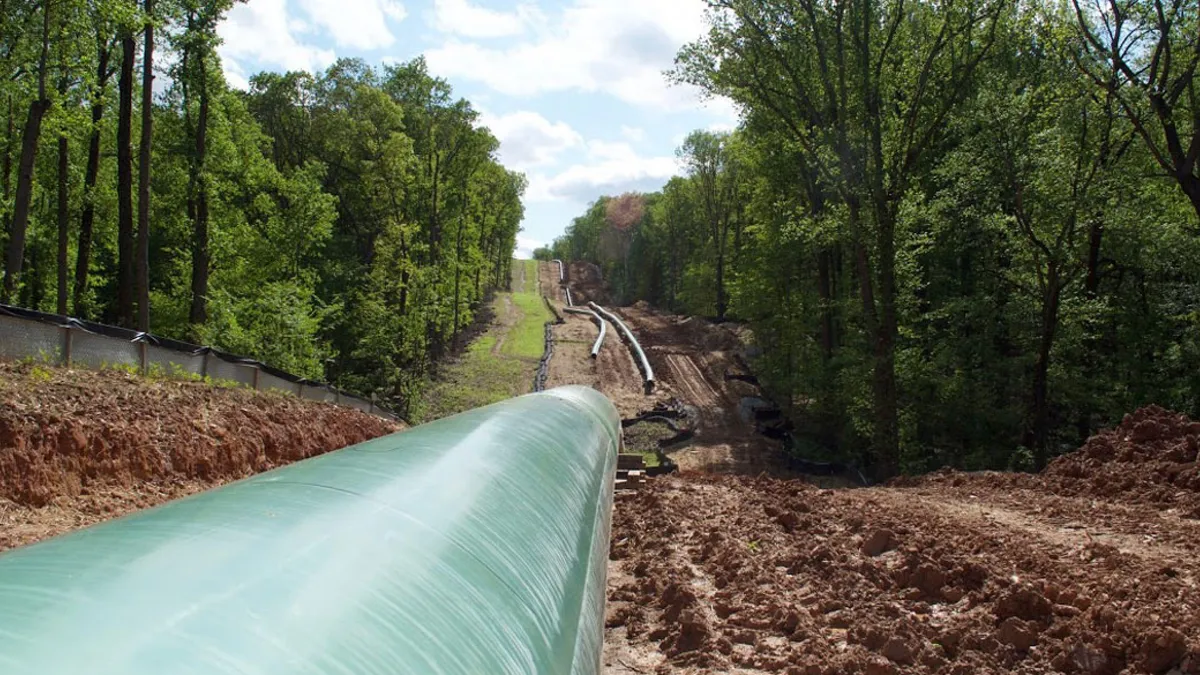UPDATED: This article was updated to include a Tuesday response from Enbridge that arrived after publication.
Dive Brief:
-
More than 7,000 natural gas customers on Rhode Island's Aquidneck Island are without service Tuesday morning after a pipeline issue prompted utility National Grid to cut gas supplies to the area during single-digit temperatures.
-
The utility said it suspended gas services "out of an abundance of caution" after a problem on the Algonquin gas transmission pipeline caused a low pressure event. Gov. Gina Raimondo, D, announced a state of emergency for Newport County on Monday night and opened heating centers for affected residents.
-
Earlier on Monday, pipeline operator Enbridge reported an explosion on an Ohio pipeline that serves the Algonquin, but said Tuesday the two incidents are not connected. National Grid said it would commit more than 1,000 workers to restore service, but that could take a week or more.
Dive Insight:
The Rhode Island gas outages illustrate how problems with gas transportation can affect end use customers far afield from the original disruption.
On Monday, Enbridge said a pipeline explosion had injured two people and damaged two structures in Noble County, Ohio. The explosion affected Line 10 of its Texas Eastern system, a 9,000-mile network of pipelines that supplies gas to the Northeast, including the Algonquin transmission line.
Enbridge initially did not say how that incident affected gas service to its utility customers, including National Grid. But later on Monday, the Rhode Island utility began to experience low pressure issues, prompting it to cut service to more than 7,000 customers, amounting to more than 10,000 individuals.
Later on Tuesday, an Enbridge official said the company does not believe the events are related.
"There is no connection between the event in Ohio and what happened in Rhode Island," spokesperson Michael Barnes wrote to Utility Dive in an email. "It is my understanding that Line 10 was flowing south away from the [New England], so it was not feeding into [New England]."
Instead, Enbridge said that cold temperatures caused "significantly higher demand" for gas on Algonquin, "which resulted in a disruption in service to a number of natural gas customers on Aquidneck Island in Rhode Island."
"A temporary reduction in available natural gas supply into the Algonquin system exacerbated the conditions that led to this disruption in service," the company said in an emailed statement. "We are collaborating with the local gas company and working diligently to assist in any way we can with gas service restoration efforts."
On Monday night, National Grid Rhode Island President Tim Horan said the low pressure issue originated on its system near the Portsmouth area.
“We've had to shut off roughly 360 customers in Middletown,” he said at a press conference. “We're actually working to get them shut down and turned on over the next few days, but the 6,700 customers in Newport were shut down for safety reasons."
The utility wanted to ensure "there is no issue out there on the system," Horan said, "but there wasn't enough pressure in the system to get the customers back on the way we did with the rest of the system, and that's why we shut this down."
A National Grid spokesperson on Tuesday told Utility Dive that a valve issue on Algonquin played a role in the outages, but did not elaborate further on the causes of the disruption. One natural gas expert said that could take time to determine.
"There are facts not in evidence yet," said Greg Landers, president at Skipping Stone, an energy consultancy. "Notably, other parts of the Algonquin system did not experience disruptions."
The under-pressurization issue comes months after the opposite issue — an over-pressurization problem — caused multiple gas explosions in Massachusetts, killing one person and injuring 10. Federal transportation authorities in November issued five safety recommendations after the accident, including a review of pipeline operator NiSource's "records and documentation of natural gas systems."













